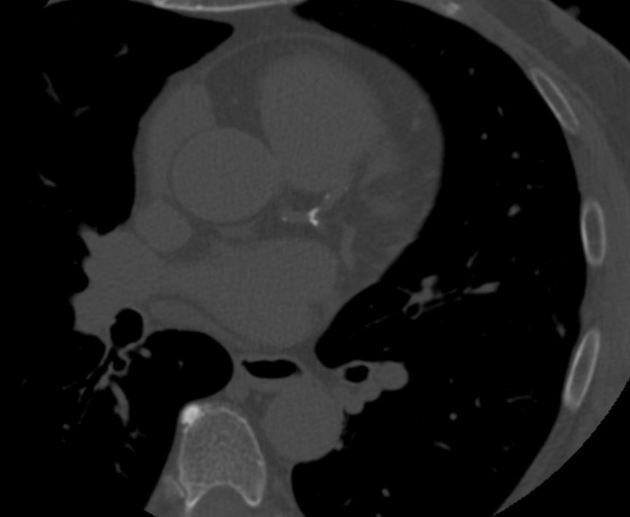Agatston score is a semi-automated tool to calculate a score based on the extent of coronary artery calcification detected by an unenhanced low-dose CT scan, which is routinely performed in patients undergoing cardiac CT. Due to an extensive body of research, the score allows for early risk stratification as patients with a high Agatston score (>160) have an increased risk for a major adverse cardiac event (MACE) 2. Although it does not allow for the assessment of soft non-calcified plaques, it has shown a good correlation with contrast-enhanced CT coronary angiography 1.
Method of calculation
The calculation is based on the weighted density score given to the highest attenuation value (HU) multiplied by the area of the calcification speck.
Density factor
130-199 HU: 1
200-299 HU: 2
300-399 HU: 3
400+ HU: 4
For example, if a calcified speck has a maximum attenuation value of 400 HU and occupies an 8 sq mm area, then its calcium score will be 32.
The score of every calcified speck is summed up to give the total calcium score.
Grading of coronary artery disease (based on total calcium score)
no evidence of CAD: 0 calcium score
minimal: 1-10
mild: 11-100
moderate: 101-400
severe: >400
Guidelines for coronary calcium scoring by 2010 ACCF Task Force
These guidelines are the latest at the time of writing (July 2016):
intermediate cardiovascular risk and asymptomatic adults (class IIa)
low-to-intermediate risk and asymptomatic adults (class IIb)
low risk and asymptomatic (class III)
asymptomatic adults with diabetes mellitus, 40 years of age and older (class IIa)
Cardiovascular risk calculator
Many risk calculators are available. Framingham cardiovascular risk calculator uses age, gender, total cholesterol, HDL cholesterol, smoking history, systolic blood pressure, and antihypertensive medication use 5.
In one retrospective study, a semi-automated, modified Agatston score applied to the abdominal aorta in non-contrast CT outperformed the Framingham score 8.
Calcium scoring has been useful during post-mortem CT (PMCT) in cases such as sudden cardiac death 10.





 Unable to process the form. Check for errors and try again.
Unable to process the form. Check for errors and try again.